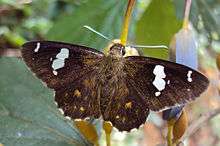Celaenorrhinus putra
Celaenorrhinus putra, Bengal spotted flat,[2] is a butterfly in the family Hesperiidae. It is found in India[2] to south-east Asia.[1][3][4][5]
| Celaenorrhinus putra | |
|---|---|
 | |
| Scientific classification | |
| Kingdom: | |
| Phylum: | |
| Class: | |
| Order: | |
| Family: | |
| Genus: | |
| Species: | C. putra |
| Binomial name | |
| Celaenorrhinus putra | |
| Synonyms | |
| |
Description
Male. Upperside dark fuliginous-blackish-brown, nearly black, much darker than Celaenorrhinus leucocera, with some greenish-ochreous hairs in the basal area of both wings. Forewing with three semi-hyaline, small, sub-apical spots, in an outwardly oblique curve from near the costa, with the usual two lower spots placed outwards, the upper spots not conjoined and smaller than in leucocera, a discal band, not nearly so outwardly oblique as in C. leucocera, the upper end within the extremity of the cell, its upper half smaller than its lower, a short square spot in the interspace below, separated by the median vein, its inner side below the middle of the upper spot, its outer side very little beyond the other, a dot near the base of the second median interspace well separated from the two large spots, another also well separated below the lower outer edge of the lower large spot. Cilia brownish basally, whitish outwardly, not checkered as in C. leucocern. Hindwing much as in C. leucocera. Underside blacker than the upperside, markings similar, with an extra ochreous dot in the middle of the cell. Antennae, palpi, and body above and below as in C. leucocera. Female like the male above and beneath.
Subspecies
- Celaenorrhinus putra putra (India)[6]
- Celaenorrhinus putra piepersi Fruhstorfer, 1909 (Java)
- Celaenorrhinus putra sanda Evans, 1941 (Burma, Thailand, Laos, Malay Peninsula)
- Celaenorrhinus putra brahmaputra Elwes & Edwards, 1897 (Kinabalu)
References
| Wikimedia Commons has media related to Celaenorrhinus putra. |
| Wikispecies has information related to Celaenorrhinus putra |
- "Celaenorrhinus Hübner, [1819]" at Markku Savela's Lepidoptera and Some Other Life Forms
- R.K., Varshney; Smetacek, Peter (2015). A Synoptic Catalogue of the Butterflies of India. New Delhi: Butterfly Research Centre, Bhimtal & Indinov Publishing, New Delhi. p. 36. doi:10.13140/RG.2.1.3966.2164. ISBN 978-81-929826-4-9.
- E. Y., Watson (1891). Hesperiidae Indicae : being a reprint of descriptions of the Hesperiidae of India, Burma, and Ceylon. Madras: Vest and Company. p. 139.
- W. H., Evans (1949). A Catalogue of the Hesperiidae from Europe, Asia, and Australia in the British Museum. London: British Museum (Natural History). Department of Entomology. p. 99.
-

- "Celaenorrhinus putra Moore, 1865 – Restricted Spotted Flat". Retrieved 15 September 2017.